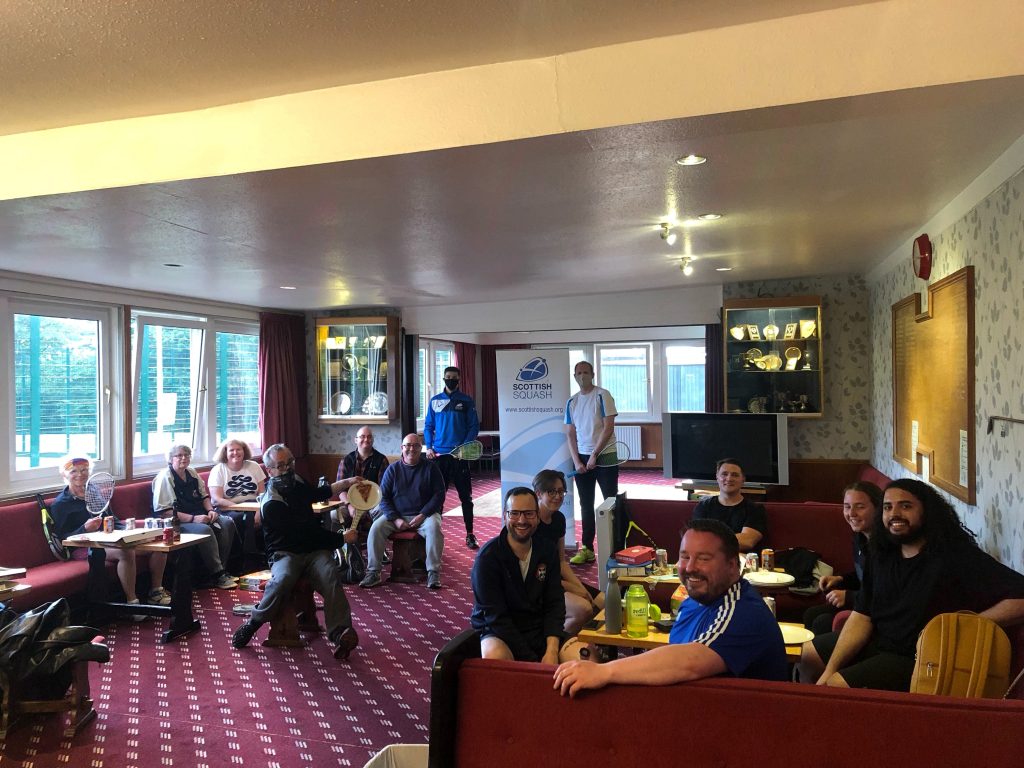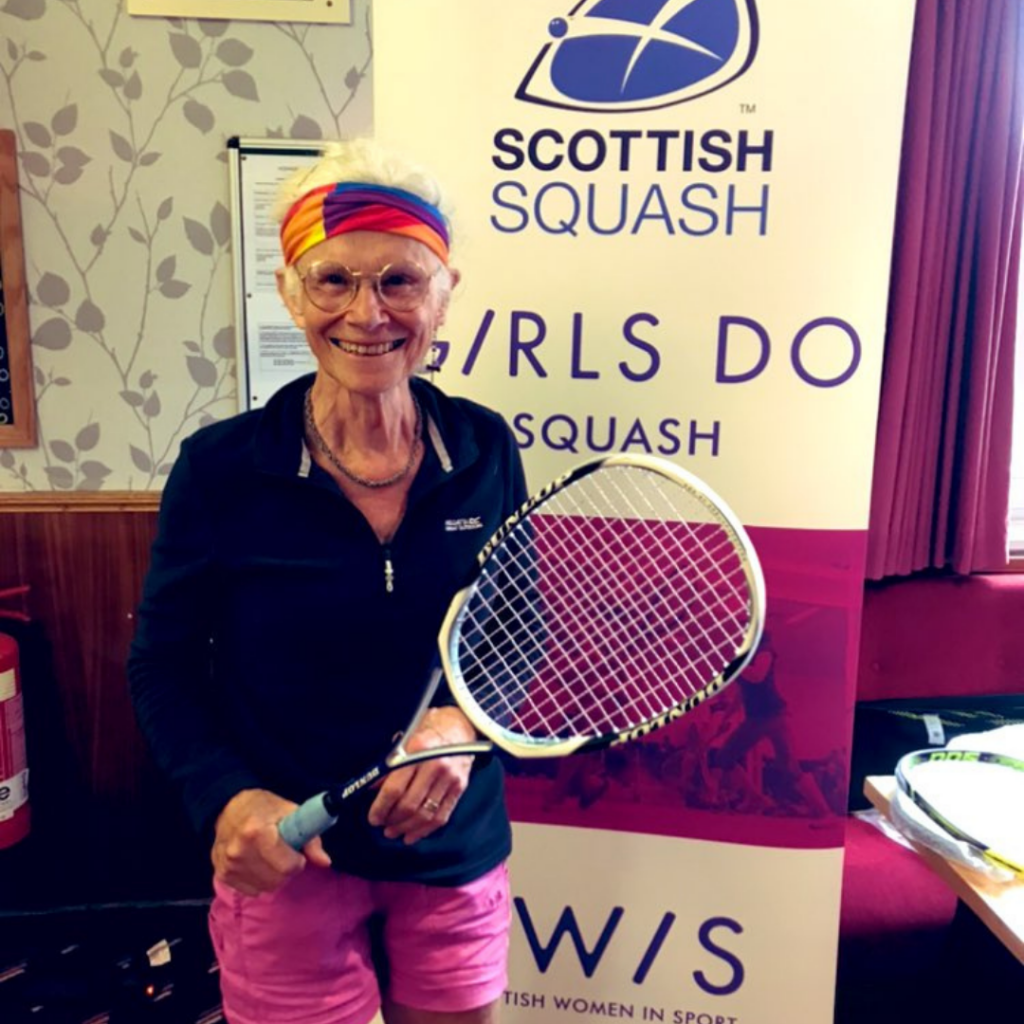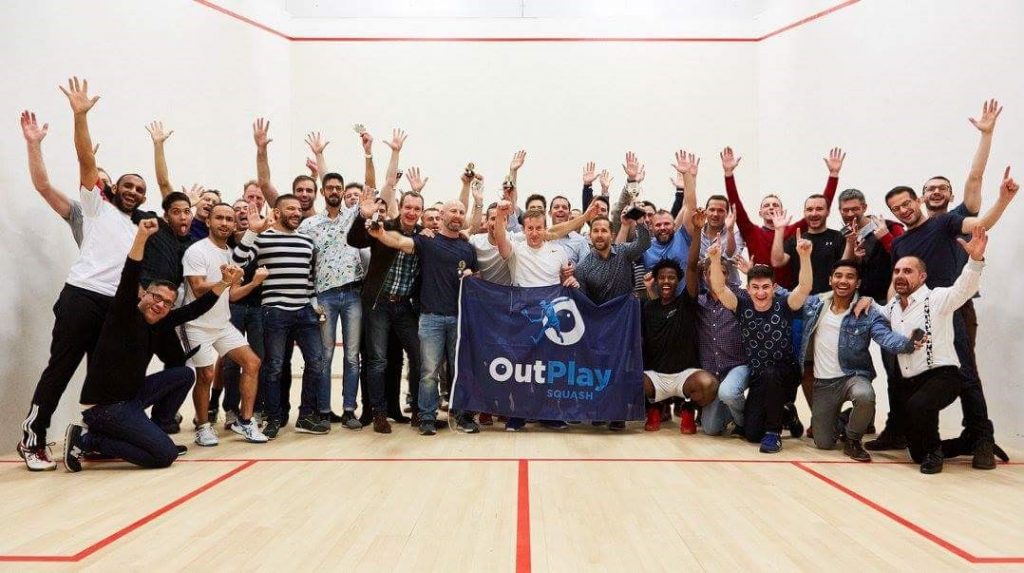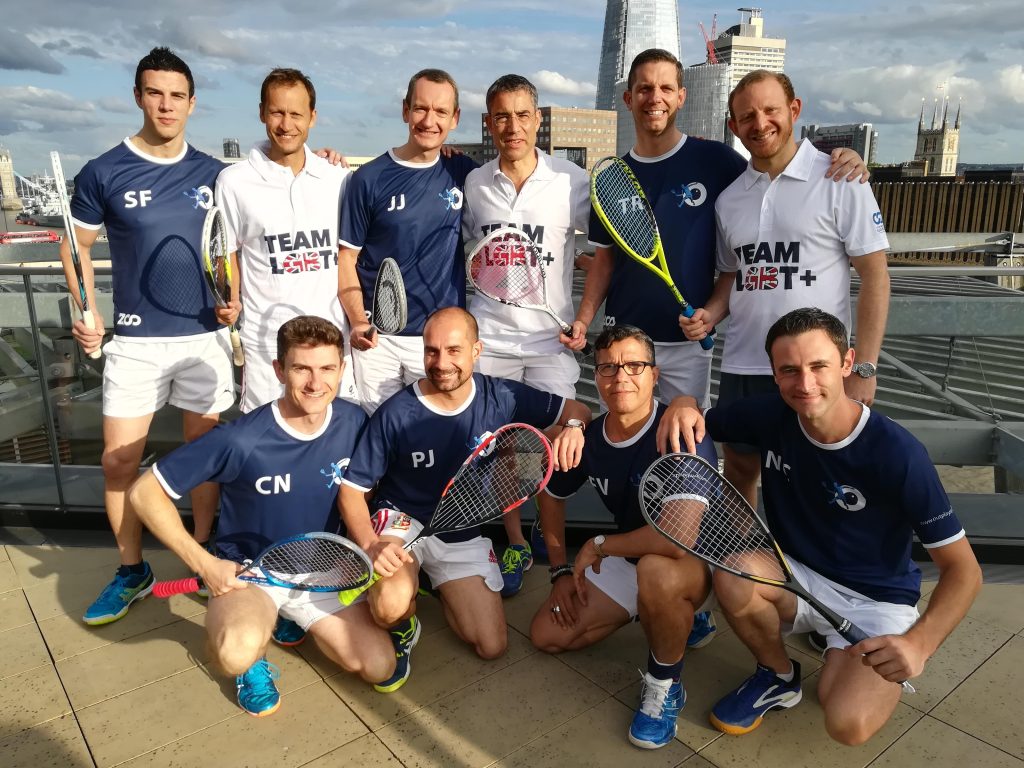
It’s great to see an international community that is joined together through a love for squash. In this instance a network of LGBT+ squash clubs that host competitive and social events across the globe (check out our previous article). We talk with Jonathan MacBride of Colinton Squashers and Alexander Jan of OutPlay Squash to find out more about LGBT+ inclusive squash clubs.
Name: Jonathan MacBride
Role: Founder of Colinton Squashers, squash player for 32 years
Club: Colinton Castle Squash Club
Country: Scotland
How did Colinton Squashers become what it is today?
Colinton Squashers started in 2005 when I started a new job and people wanted to play squash with me. It’s not as much fun for anyone when a social player and a league player arrange a game so, after a couple of friendlies, I organised a weekly social night where they could all play me and each other, then get together in the club bar afterwards. It worked because with a variety of standards there would always be someone you could beat and someone you could lose to and I could keep the ball going and make it a fun time for the least experienced player. Then we always finished with bringing everyone together for some 3/4 court and continued the social aspect in the bar afterwards.
The group developed by word of mouth and when I met new people I jumped on any spark of interest in squash and sold them the social night. As an out gay man, many of my social groups included LGBT+ people so more and more LGBT+ people started to come along. In 2008 I searched online if other clubs existed for LGBT+ people and discovered not only London’s OutPlay but also competitions. In 2009 I entered the World OutGames in Copenhagen and won!
How would you describe the club and what experience do you hope to give the members?
Colinton Squashers is an inclusive club which aims to bring LGBT+ people and friends, beginners, improvers and social players together for a weekly social evening of squash and chat. Sharing tips from coaching I had received as a junior, I was inspired by the club members to do coaching qualifications and in 2012 I achieved UKCC level 2. Club nights are whatever the players want them to be, depending on how energetic they feel like and how much they want to chat! I’m there to have fun playing, to coach if asked, and to enjoy the company of people like me who enjoy playing squash, and that’s the experience I hope to give to the members.
Do you feel as though squash is an inclusive sport from your experience?
On court, playing squash, we’re all hitting that next ball, running to the opposite corner, no matter your race, gender, age or sexuality, but we could do so much more to let LGBT+ people know that they are welcome on court with us. Squash can be known as an inclusive sport but little appears to be done as a sport to highlight that fact. With equal prize money and both mens and womens events taking place at the same time, there are definitely global efforts being made to promote equality in squash focussed on gender, but nothing to promote squash to lesbian, gay, bi, trans or non-binary people.
In Scotland, people at the governing body have put in time and effort to learn from Scottish LGBTI charity, LEAP Sports Scotland, and to engage with LGBT+ people at Pride events to show them that they are welcome at squash clubs in Scotland. Following work with the Equality Network, Scottish Squash signed the LGBT Sports Charter. Stonewall’s Rainbow Laces were given out at Masters tournaments. I have been proud of this work from Scottish Squash but much more needs to be done in clubs.
While I haven’t found barriers, and my own club board has been very supportive, in all my league matches and tournaments across Scotland I have not found anything to explicitly show that a club is welcoming to LGBT+ people; nothing to show that someone like me might exist anywhere else in Scotland. In fact, I have only ever known of one other out LGBT+ league squash player in all of Scotland. Why is that?
Do you feel there is enough representation at a professional level for LGBT+ initiatives? Is there anything you would like to see more of or change?
When Jenny [Duncalf] and Rachael [Grinham] came out in 2017 in Squash Magazine, I was ecstatic. Finally my sport included someone like me. When Todd [Harrity] came out in 2018 on Twitter, I read and re-read his statement and related closely to his words. I have represented Ulster at junior and senior competitions but never have I thought I could be the best LGBT+ squash player in the world: can you imagine, when I won the World OutGames in 2009 that there were no other openly LGBT+ squash players better than me? I knew it couldn’t be the case. They either were out in their locality but didn’t know about the competition or they would eventually come out. And Jenny, Rachel and Todd came out.
Last year I reached out on social media to Todd and Jenny to take part in a LEAP Sport Scotland series of interviews with LGBT+ sports stars and I was stunned and incredibly happy when they agreed. They both gave their first on-camera interviews where they talked about their sexuality and squash (totalling almost 5000 views so far!). Their words resonated so much with me and their insight into the professional game and the welcoming environment gave me hope for the future of LGBT+ people in squash. It saddens me that when Rachael retires there will be no out LGBT+ women playing professional squash.
I would love to see the PSA and World Squash celebrate LGBT+ people in squash, celebrate the local initiatives, the clubs, the volunteers who put in time for the love of the game, and then work to build on that. There are LGBT+ squash clubs in many European cities but why not elsewhere? Could people be supported to set up LGBT+ squash clubs across the world? The clubs which exist already provide a source of exercise and social network to hundreds of LGBT+ people. Some members play in local leagues. Without these LGBT+ clubs very few members would play squash at all so let’s inspire more people to set up clubs in their city and get more people playing squash as part of their social calendar.
The PSA and World Squash could also highlight good work by countries’ governing bodies and encourage other countries to follow suit.
What does Pride mean to you?
Pride represents a protest and a celebration. On one day of the year I can walk along the streets of Edinburgh and hold my husband’s hand without getting any odd looks. I know I’m lucky to be born in the UK, in comparison to many countries around the world who don’t have the same legal protections for LGBT+ people. I protest the inequality, the discrimination, the bullying. I celebrate the ground we have gained, the activists who came before me, my friends and the thousands I don’t know but for one day I am together with; I celebrate my love for my husband. On a Pride march I am free to be me.
Name: Alexander Jan
Role: President of OutPlay Squash
Location: London, UK
How many members does Outplay Squash have?
We currently have around 120 paid up members. Whilst modest compared to some other clubs, this is probably a record for OutPlay. And of course biggest doesn’t mean the best!
Why was OutPlay Squash created?
Many moons ago, before the age of the internet, Hugh Richards our founding player put notices in Time Out and The Pink Paper to see if there was any interest in the LGBT+ community getting together to play social squash. A key objective was to create a welcoming sociable environment for players of all backgrounds and abilities to get fit and keep fit in a non-commercial environment. Hugh must have got something right as we are just about to celebrate our 30th birthday. And Hugh is still a paid-up member!
How would you describe the club, what experience do you hope to give the members?
The ethos of the club that Hugh founded in 1991 is one that we try hard to nurture and maintain. OutPlay aims to provide a welcoming environment for players of all levels and backgrounds – from beginners who might live down the road through to more advanced players who have moved to the UK and are looking to make friends and join a squash community. We place a lot of emphasis on the social side of things – that takes the form of drinks and a bite to eat after one of our regular squash sessions and more organised activities both at home and abroad. In addition, we have a team in the Middlesex squash league which provides a bit more of a challenging squash environment for our more advanced players. Doing all this requires quite a lot of hardwork and effort. Without our committee that would be impossible. My fellow members, Nick, Fabian, Sath and Dave do a fantastic job. I think the membership are genuinely appreciative of the time we invest in keeping the club going – although it’s not always entirely evident how much organising needs to be done sometimes!
What kind of activities does your club run?
We run around three to four regular two-hour social squash sessions in central London (at the Finsbury/Old Street and Queen Mother/Victoria leisure centres) at weekends and (pre-Covid) mid-week. These form the heart of the club’s activities and are often followed by a pint at the pub or a bite to eat. We run a mini-tournament for members once a year plus an open competition that our friends in Coolhurst have very generously hosted. Then there are the internationals. You may be surprised to hear that there is a pretty big network of sister clubs all over Europe. We participate in their tournaments as well. This is a great way for OutPlayers, to improve their squash in a slightly more competitive environment and make new friends or renew old acquaintances. We also organise drinks with other LGBT+ sports clubs in London. And our Christmas party is always a sell-out. Fabian, our social secretary has a full-time job!
What is it about OutPlay squash that the members enjoy?
From my experience as president, it’s the combination of the sport and social aspects and I’d like to think they see us as well organised. On a personal level, it is really great to see new players improve their game over time. By being open and welcoming, we want to give people a chance to let off steam on court, keep fit and then relax with friends afterwards and forget about work for a couple of hours! Travel is a big draw for some members – they really look forward to the international tournaments and getting away for a long weekend with friends. But perhaps most importantly of all, it’s a great way to make new and lasting friendships, particularly, if you’ve recently left a relationship, just come out or arrived here from another part of the world. There have been a few romances formed on court too!
Do you feel as though squash is an inclusive sport from your experience?
Overall, as an LGBT+ club I don’t think we have faced enormous barriers. In many ways our biggest challenges are those facing all squash clubs: the cost and availability of good courts, encouraging people to get into the game in the first place, trying to organise coaching and getting the balance right to keep more advanced players engaged. We also need to focus on keeping our membership levels buoyant and we would love to encourage a bit more diversity in our membership.
Do you feel there is enough representation at a professional level for LGBT+ initiatives? Is there anything you would like to see more of or change?
I don’t think we are looking for special attention. But it would be great to see more interest from the professional wing of squash in the amateur game and a recognition that it can and should be as diverse as any other sport. Seeing more “out” players on the professional circuit would also be great – it might encourage more people to get involved with the sport at grassroots level.
What does Pride mean to you?
Pride is essentially a day that the LGBT+ Community comes together to celebrate its diversity. It represents a number of communities coming together. I would like to hope that OutPlay continues to emulate those attributes for LGBT+ squash players.
The PSA Foundation strives for equality and inclusion across our squash community. Finding clubs and communities that are passionate about growing our sport is part of our mission. We celebrate these efforts and look forward to inspiring others to follow.
Check out this useful document on how to make your club/venue more LGBT+ inclusive: https://learn.sportenglandclubmatters.com/pluginfile.php/21577/mod_resource/content/1/Make%20Sport%20Everyones%20Game.pdf
If you would like to find out more about what LGBT+ squash clubs there are, you can take a look here: http://www.grcdi.nl/gaysquash/clubs.htm
There’s also a Facebook group for club members dotted across the world here: https://www.facebook.com/groups/gaysquash
Check out the upcoming Gay Games in Hong Kong here: https://gaygames.org/








